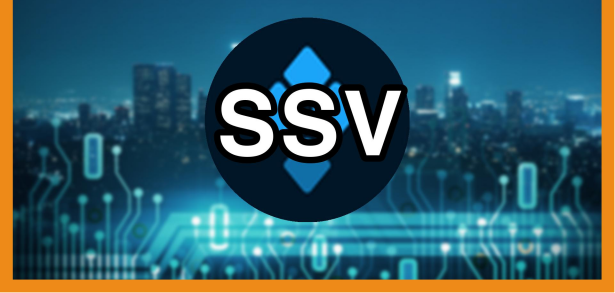
In the ever-changing world of cryptocurrency and blockchain, ssv.network is like a shining star, injecting new vitality into the Ethereum ecosystem. ssv.network is more than just a decentralized staking infrastructure, it is a platform that enables secure and private communication between parties without the need for intermediaries or third parties. It is built on the Ethereum blockchain, taking full advantage of the security and reliability of the Ethereum network. On this platform, a technology called Secret Sharing Verifier (SSV) is used. These decentralized nodes work together to jointly verify and confirm communications between parties, ensuring the security and reliability of communications.
Basic information about ssv.network
Currency name: ssv.network
Currency code: SSV
Official website: ssv.network
Total supply: 11,012,871
Launched in: 2021
All-time high: $42.44 (February 23, 2023)
Trading platforms: Binance, KuCoin, Uniswap (V3), Gate.io, Huobi, Bybit, BitMart
Supported wallets: Trust Wallet, MetaMask
Technical advantages of ssv.network
Improve the robustness and activity of Ethereum nodes
The emergence of ssv.network not only improves the robustness, activity and fault tolerance of nodes in the entire Ethereum ecosystem, but also distributes validator keys between node instances compared to traditional staking schemes. method is undoubtedly a major breakthrough. Traditional staking solutions have certain shortcomings in terms of offline storage of validator keys, "active-to-active" redundancy, customizability of node instances, and threshold signature schemes. The emergence of ssv.network is precisely to make up for these shortcomings and bring a more efficient and secure verification method to the Ethereum ecosystem.
Technology core
Optimized upgrade and maintenance: The design of SSV makes node upgrade and maintenance more flexible. One operator's node can be shut down at any time for upgrade without affecting the normal work of the other three operators. By performing 4 operations in turn, the entire upgrade process can be completed. This mechanism helps improve the decentralized nature of ETH2.0 and reduces the risk of single-point downtime, because the offlineness of a single operator will not affect the signature verification of the node.
Prevent outsourced service providers from doing evil: SSV adopts an advanced security strategy that eliminates the need to share the signature private key with outsourced service providers. Instead, it distributes shards of the signing private key to different operators, effectively preventing potential bad behavior. This practice ensures that operators cannot perform other malicious activities while maintaining nodes.
Convenience for node operators: With SSV, node upgrades and maintenance become easy and convenient. Operation and maintenance personnel can more easily upgrade and maintain nodes, thereby greatly improving the node's risk resistance, including reducing potential threats caused by risks such as complete private key exposure, node server downtime, and hacker attacks. At the same time, It also reduces the possibility of node upgrades and maintenance going offline.
Extensive participation in open source protocols: SSV adopts open source protocols, attracting extensive participation from 17,879 validators and more than 3,658 node operators. This means that many community members are contributing to SSV work and improvements, working together to advance the technology.
Ecological empowerment of token SSV
The total amount of SSV is 10 million, fully circulated, formerly CDT (Distributed Validator Technology) deflation 100 times to the current 10 million. The business space of distributed validator technology is small, so the team transformed into distributed staking and achieved remarkable results.
The SSV token serves as the payment layer of the network, creating economic incentives for operators. Each operator can determine their fees and compete with other operators for stakers. Stakers choose multiple operators to manage their validators and must maintain a minimum SSV balance to pay their operator fees.
With the ETH2.0 upgrade in full progress, SSV will receive more and more node operation and maintenance orders in the future. Node pledgers need to pledge a certain amount of SSV to ensure that operators have enough profits to help operate and maintain ETH2.0 nodes (pledged (part of which will be consumed slowly), operators also need to pledge SSV to ensure the safety and reliability of operating nodes, which will greatly limit the liquidity of SSV and cause the price of SSV to rise.
SSV future value
SSV is currently in the second stage of the mainnet launch. It is not difficult to imagine that after the SSV mainnet is launched, it will be an irresistible choice for individual pledgers, pledge service providers, node operators, CEX pledgers and other parties, and it may become ETH2. 0 A rigid need for pledge node management. If half of the 26 million ETH pledged were migrated to the SSV network, it would be the largest amount of TVL in history.
SSV officially claims that SSV is the layer 0 of ETH2.0. Such an important basic technology, and in the big field of cash flow, also has very good value capture empowerment. Pledgers need to pay SSV coins for computing power, and operators must also pledge SSV coins to prevent evildoers. It is not just a DAO governance token. It is not difficult to expect a market value of 5 billion US dollars. One 500U should be easily achievable.
Finally: there are still many things that have not been written in, such as specific opportunities and specific decisions. These things often cannot be summarized in one article. If you want to know more about the currency circle and first-hand cutting-edge information, please send me a private message to consult me. We have the most professional currency circle community and publish market analysis and high-quality potential currency recommendations every day.